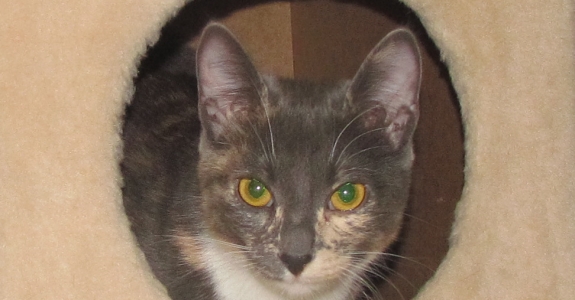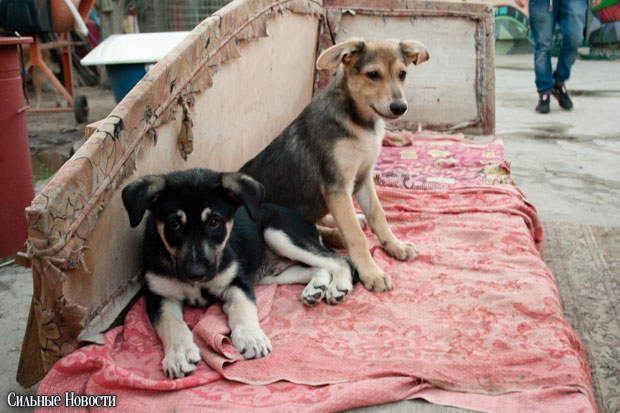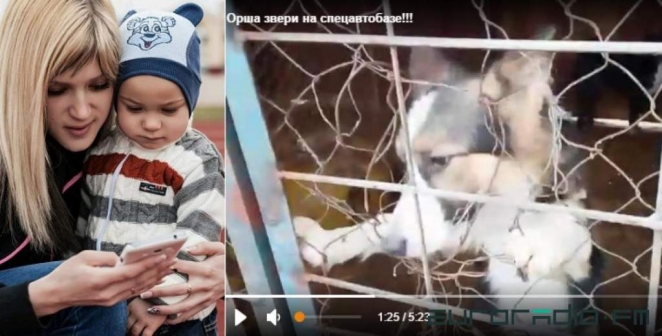Animal cruelty in Belarus
Olga Hryniuk, BelarusDigest
23 May 2018, 00:25
 In March 2018 several Belarusian media reported the shocking treatment of homeless animals in Babruisk. Staff members at the animal shelter, which has been nicknamed the “death camp”, allegedly applied the euthanasia drug T61 on unsedated animals, causing immense suffering to thousands of cats and dogs. The volunteers from a Babruisk-based animal protection society, “Goodness”, have campaigned against animal abuse at the “death camp”, yet their voices remained unheard.
In March 2018 several Belarusian media reported the shocking treatment of homeless animals in Babruisk. Staff members at the animal shelter, which has been nicknamed the “death camp”, allegedly applied the euthanasia drug T61 on unsedated animals, causing immense suffering to thousands of cats and dogs. The volunteers from a Babruisk-based animal protection society, “Goodness”, have campaigned against animal abuse at the “death camp”, yet their voices remained unheard.
At present, Belarusian legislation does not penalise animal abuse. Instead of regulating pets’ reproduction properly, the Belarusian state mandates the capture and killing of homeless animals to municipal services and private organisations. Consequently, about 80,000 homeless cats and dogs vanish each year in animal shelters similar to Babruisk’s “death camp”. So far, Belarusian state officials have ignored constructive legislative proposals submitted by the animal protection societies.
Animal cruelty in Belarus from the legal point of view
Thousands of cats and dogs become homeless in Belarus each year. Some are abandoned by their owners, others live the street life from birth. Most end up in animal shelters. After a basic medical check, the shelters’ staff immediately put down the ill ones. The healthy animals remain in a shelter for about a week. After that time, if no one has adopted them, the shelter performs euthanasia and sends the animals’ remains for processing into bone flour.
Not everyone in Belarus agrees with such a sad state of affairs. Numerous volunteers and animal protection societies across the country petition to stop the legalised animal abuse. According to Hanna Khrapunenka, the board member of “Egida” animal protection society, Belarusian animal welfare legislation requires urgent reform. While the Belarusian state considers the capture and killing of homeless animals the only way to control their reproduction, more humane options also exist.
![Animal cruelty in Belarus Animal cruelty in Belarus]()
Animal protection societies “Egida” and “Zoochance” have proposed a number of changes to the existing law on animal treatment. First, the state should arrange proper animal shelters instead of “death camps” – temporary places where pets painfully await their death. Moreover, revised legislation should prohibit cruel animal treatment, exercised by municipal services on a daily basis.
Second, the state should actively promote compassion towards homeless animals and encourage people to adopt pets from the shelters. Third, the new law should ban reproduction of mongrels and not pure-bred animals. Only certified pure-bred animals should reproduce, provided their owners pay a special reproduction tax.
Hanna Khrapunenka emphasises the high demand for pure-bred animals as a separate problem. Many Belarusians willingly buy pure-bred or semi-pure-bred animals. As a result, animal breeders stimulate the reproduction of pure-bred species and mongrels, while thousands of non-pure-bred cats and dogs have to die on streets or in shelters.
How social media save thousands of animals from “death camps”
Social media play a crucial role in spreading information about pets staying in animal shelters. Belarusian volunteers have created numerous groups on social networks, where they constantly update information about animals in an urgent need of a host. For instance, Olga Barbarchyk, a volunteer from Minsk, created a group on the VKontakte social network in order to help homeless animals trapped in Minsk’s ill-reputed animal shelter “City’s Fauna”. During the four years of the group’s existence, numerous hosts from Belarus and Russia have adopted pets from “City’s Fauna”.
The web-portal egida.by, established by the “Egida” animal protection society, maintains an online database of homeless animals rescued from animal shelters across Belarus. Anyone willing to adopt a pet should contact “Egida’s” support team. The option of online donations also exists for those unable to take a pet.
A group of social activists from Minsk has recently developed a remarkable initiative, “Happiness Greets you With a Paw”. The initiative aims to combine assistance to the elderly with homeless pets’ adoption. The activists proposed to take homeless animals to elderly people living separately from their relatives. By taking care of pets, the elderly should increase their mobility and communication practices. The organisers stressed that only adult pets could take part in the initiative since they possess fewer chances to find a host. Moreover, all the pets participating undergo a prior medical check.
The persecution of animal protection activists
While providing a heroic service, Belarusian animal protection activists have experienced several persecutions from the animal shelters’ administrations. The case of Juliya Hrenkava, a volunteer from Orsha, received particular attention in Belarus’s media.
On 21 March 2017, Ms Hrenkava live-streamed her secret visit to the animal shelter in Orsha via the social media platform Odnoklassniki. She wanted to show the pets to potential hosts. The following day the local police detained Ms Hrenkava for unlawful entry to the shelter.
The Orsha court classified Ms Hrenkava’s live-streaming as a “foreign media production” and fined the volunteer for “illegal media production and distribution”. Eventually, Hrenkava’s case became the first incident of a vlogger persecuted by Belarusian authorities.
Veranika Hantsevich, the chair of “Egida” animal protection society, also recalls the persecution of animal protection activists. In 2012 the administration of the notorious Minsk’s animal shelter “City’s Fauna” kicked out volunteers who took care of the trapped animals and searched for potential hosts.
According to Iryna Kavalerava, the chair of Babruisk’s “Goodness” animal protection society, the administrations of Belarus’s animal shelters pursue their own financial interests. In particular, Kavalerava mentions that the administration of Babruisk’s “death camp” allegedly received unconfirmed financial rewards for putting down as many homeless pets as possible. Unsurprisingly, the efforts of animal protection societies sometimes meet a wall of resistance.
Mahatma Gandhi once stated that “the greatness of a nation and its moral progress can be judged by the way that its animals are treated.” Unfortunately, the ignorant attitude of the Belarusian state towards homeless animals demonstrates an obvious moral regress. The state’s unwillingness to develop advanced animal welfare legislation cannot be justified. Despite this, the countless efforts of Belarusian volunteers and animal protection societies bring hope.
23 May 2018, 00:25

A cat from Belarus
At present, Belarusian legislation does not penalise animal abuse. Instead of regulating pets’ reproduction properly, the Belarusian state mandates the capture and killing of homeless animals to municipal services and private organisations. Consequently, about 80,000 homeless cats and dogs vanish each year in animal shelters similar to Babruisk’s “death camp”. So far, Belarusian state officials have ignored constructive legislative proposals submitted by the animal protection societies.
Animal cruelty in Belarus from the legal point of view
Thousands of cats and dogs become homeless in Belarus each year. Some are abandoned by their owners, others live the street life from birth. Most end up in animal shelters. After a basic medical check, the shelters’ staff immediately put down the ill ones. The healthy animals remain in a shelter for about a week. After that time, if no one has adopted them, the shelter performs euthanasia and sends the animals’ remains for processing into bone flour.
Not everyone in Belarus agrees with such a sad state of affairs. Numerous volunteers and animal protection societies across the country petition to stop the legalised animal abuse. According to Hanna Khrapunenka, the board member of “Egida” animal protection society, Belarusian animal welfare legislation requires urgent reform. While the Belarusian state considers the capture and killing of homeless animals the only way to control their reproduction, more humane options also exist.

Source: gomel.today
Animal protection societies “Egida” and “Zoochance” have proposed a number of changes to the existing law on animal treatment. First, the state should arrange proper animal shelters instead of “death camps” – temporary places where pets painfully await their death. Moreover, revised legislation should prohibit cruel animal treatment, exercised by municipal services on a daily basis.
Second, the state should actively promote compassion towards homeless animals and encourage people to adopt pets from the shelters. Third, the new law should ban reproduction of mongrels and not pure-bred animals. Only certified pure-bred animals should reproduce, provided their owners pay a special reproduction tax.
Hanna Khrapunenka emphasises the high demand for pure-bred animals as a separate problem. Many Belarusians willingly buy pure-bred or semi-pure-bred animals. As a result, animal breeders stimulate the reproduction of pure-bred species and mongrels, while thousands of non-pure-bred cats and dogs have to die on streets or in shelters.
How social media save thousands of animals from “death camps”
Social media play a crucial role in spreading information about pets staying in animal shelters. Belarusian volunteers have created numerous groups on social networks, where they constantly update information about animals in an urgent need of a host. For instance, Olga Barbarchyk, a volunteer from Minsk, created a group on the VKontakte social network in order to help homeless animals trapped in Minsk’s ill-reputed animal shelter “City’s Fauna”. During the four years of the group’s existence, numerous hosts from Belarus and Russia have adopted pets from “City’s Fauna”.
The web-portal egida.by, established by the “Egida” animal protection society, maintains an online database of homeless animals rescued from animal shelters across Belarus. Anyone willing to adopt a pet should contact “Egida’s” support team. The option of online donations also exists for those unable to take a pet.
A group of social activists from Minsk has recently developed a remarkable initiative, “Happiness Greets you With a Paw”. The initiative aims to combine assistance to the elderly with homeless pets’ adoption. The activists proposed to take homeless animals to elderly people living separately from their relatives. By taking care of pets, the elderly should increase their mobility and communication practices. The organisers stressed that only adult pets could take part in the initiative since they possess fewer chances to find a host. Moreover, all the pets participating undergo a prior medical check.
The persecution of animal protection activists
While providing a heroic service, Belarusian animal protection activists have experienced several persecutions from the animal shelters’ administrations. The case of Juliya Hrenkava, a volunteer from Orsha, received particular attention in Belarus’s media.
Source: euroradio.fm
On 21 March 2017, Ms Hrenkava live-streamed her secret visit to the animal shelter in Orsha via the social media platform Odnoklassniki. She wanted to show the pets to potential hosts. The following day the local police detained Ms Hrenkava for unlawful entry to the shelter.
The Orsha court classified Ms Hrenkava’s live-streaming as a “foreign media production” and fined the volunteer for “illegal media production and distribution”. Eventually, Hrenkava’s case became the first incident of a vlogger persecuted by Belarusian authorities.
Veranika Hantsevich, the chair of “Egida” animal protection society, also recalls the persecution of animal protection activists. In 2012 the administration of the notorious Minsk’s animal shelter “City’s Fauna” kicked out volunteers who took care of the trapped animals and searched for potential hosts.
According to Iryna Kavalerava, the chair of Babruisk’s “Goodness” animal protection society, the administrations of Belarus’s animal shelters pursue their own financial interests. In particular, Kavalerava mentions that the administration of Babruisk’s “death camp” allegedly received unconfirmed financial rewards for putting down as many homeless pets as possible. Unsurprisingly, the efforts of animal protection societies sometimes meet a wall of resistance.
Mahatma Gandhi once stated that “the greatness of a nation and its moral progress can be judged by the way that its animals are treated.” Unfortunately, the ignorant attitude of the Belarusian state towards homeless animals demonstrates an obvious moral regress. The state’s unwillingness to develop advanced animal welfare legislation cannot be justified. Despite this, the countless efforts of Belarusian volunteers and animal protection societies bring hope.


